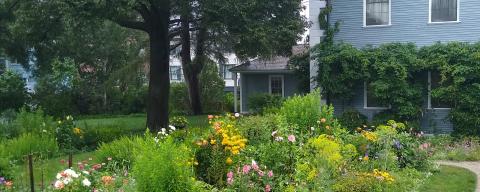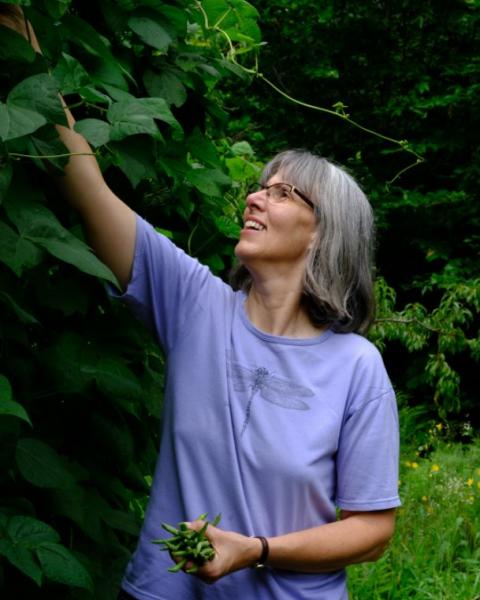Teamwork Makes History Grow
The Moffatt-Ladd House in Portsmouth was built in 1763 on a slope overlooking the Piscataqua River. Behind the house, an extensive garden and two-terraced landscape were established. The Moffatt, Whipple and Ladd families lived in the house until 1900. It became a museum in 1912 when the N.H. Society of Colonial Dames of America obtained the property at what is now 154 Market Street, Portsmouth. They restored the one-acre garden in a Colonial Revival style, current to this day.
Katharine Moffatt Whipple was the first documented gardener on the property. The last house resident, Alexander Hamilton Ladd, was an avid gardener, so much so he kept a detailed garden journal from 1888-1895. His specialty was tulips and in 1889 Alexander wrote he lost 60,000 tulips to “rain & want of attention.” Still surviving from early plantings are an English Damask Rose, the “Bride’s Rose,” planted in 1764, and a horse chestnut tree planted in 1776.
In May 2023, Linda Begiebing, a 12-year Moffatt-Ladd House and Garden volunteer spoke to the Master Gardener 2023 spring class about helping to update “an existing map of the garden to include all the plants in the flower beds and along the perimeter of the property.” The project goal was to combine existing plant lists to a master list. The end result would be “a neat, handwritten document.”
After Linda’s presentation, she “hoped one or two people might be interested.” What she got was a “team of five Master Gardener interns who were all … enthusiastic about the project.” Those interns, now Master Gardeners, were a married couple Pat Frisella and Manny Krasner, Betsy Coes, Cathy Arakelian and Diane Howes.
Manny began in an administrative role, writing a project proposal for Moffatt-Ladd House and Garden. “I anticipated I would be doing much of the mapping,” he says, but he “discovered Cathy had mapping skills and experience that went far beyond me.”
Pat says, “I thought the garden was lovely,” but was a bit “overwhelmed” when she first saw it. She questioned whether the team could complete all the tasks Linda presented, such as creating a self-guided map and guide for visitors; identifying and cataloguing all garden plants; and creating a complete plant list for visitors, in-house gardeners and staff.
The Master Gardener team decided to “break into teams to work on the [plant] inventory.” Manny and Pat went every Tuesday for three hours from May-October. “Every time we went, we noted the plants and where they were located.” Of the 250 plants, probably 230 were first identified by Pat, reported Manny.
On Manny and Pat’s second garden visit, they met a Moffatt-Ladd volunteer gardener who handed them “a sheaf of maps and a small copy of a plot plan” done by professionals. Manny contacted the company and received a copy of the original plan.
Betsy remarked, the entire group was “struggling with how to tackle such a large and incredibly diverse garden” when she suggested dividing it into “bite-sized” pieces. Pat knew many of the plants, Cathy and Diane conducted additional identifications. Pat took on the task of logging plants and cataloging their distinguishing features onto a spreadsheet.
Cathy matched the plant lists with maps and used her graphic design skills to create an attractive guide for visitors.
On any group project, many skills are needed. Manny comments, “In our case it was Pat and Cathy carried the load, with the rest of us contributing as we could, whether by way of assistance, moral support or specific tasks.” However, clearly it took a varied team.
Linda says, the Master Gardener team accomplished their goal by June 1, 2024. “They presented us with a colorful visitors’ [brochure] of the garden, highlighting significant plants and features of the garden, an updated plant list, a spreadsheet listing every plant and where it is in the garden. They accomplished more than we expected, producing important documents that will support staff and visitors for years to come.”
The Moffatt-Ladd House and Garden is closed for the season after October 15. To learn more and plan a visit for 2025, visit their website.
Do you love learning about stuff like this?
SUBSCRIBE TO Granite State Gardening newsletter
Got questions? The UNH Extension Yard and Garden Infoline offers practical help finding answers for your yard and garden questions.
Call toll free at 1-877-398-4769, Monday to Friday, 9 a.m. to 2 p.m., or fill out webform.

